
SimCity Strategy Guides
 Power
PowerAll cities need power. Sometimes you can just buy it off a neighbor and then ah, well, it's really not that much bother at all. So long as you can afford to pay, the lights will stay on. But for those who want to provide their own power there are limited options and all have their pros and cons.
This article covers the pros and cons of each type of power station, along with an hourly cost breakdown for each of the different types of generators. For comparsion there is also a Conclusions and comparisons section which compares the total cost and power output for all the power stations and generator types (psst, nuclear fast fusion is the cheapest per MW!).
The following sections can be found in this article:
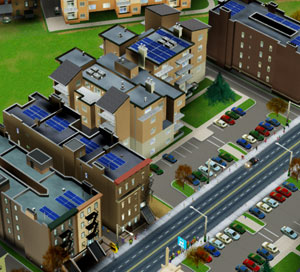
These educated Sims have solar panels on their roofs
 Spawning Solar Panels
Spawning Solar PanelsA lesser known by-product of education in SimCity is that fully educated households will spawn solar panels on their roofs. These buildings actually produce their own power, so they don't need to use power provided from the city grid. This reduces your city power needs, in addition these homes won't lose power if you have power failures.
There seems to be a lot of mis-information about the level of education required for this. I've seen people advising players that the solar panels only come with high tech industry, or it's a sign the house contains skilled workers, or it requires a fully maxed out education level. None of these are true! It actually doesn't matter what your city's education level is, nor your industrial tech level, so long as all the sims that spawned in that building at the start of the day cycle had the status of being educated or enrolled depending on their age group. In short so long as you have residential buildings which are fully educated and all students living there are enrolled, you will start to see this effect developing through-out your city.
For more information:
 Wind Power
Wind Power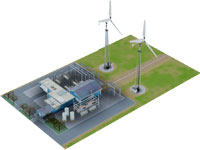
Pros: Wind power is one of the green energy options, miraculously in SimCity, these green energy power stations produce NO pollution at all (unlike in the real world). Wiind power is cheap to buy in the early city founding phase, and cheap to run. It has the great benefit that you can place additional turbines on fairly steep hills using the service road for access, making it a great space saver in cities that lose habitable land to hills.
Cons: it doesn't produce very much power for the relatively large amounts of space it requires. You can generate 122.4 using the large turbine at 10mph, but the large turbine has an approximately 96x96 meter footprint so they take up a great deal of space. The vertical turbine does make the wind farm much more viable, with a much higher power output, and they use less space than the large turbine (approx 60x60 meters each), but they are costly and require an expensive research project to unlock them.
Another thing to bear in mind is that wind power has a variable output as the wind speed will change over time. If you are using wind power, make sure you have enough spare capacity that if the wind speed drops by a couple of mph, your city won't black out. Check out the Natural Resources Listed by City to see which cities have high wind speeds (there aren't very many!).
For more information:
| Wind Power: Station Base Cost $25/hr | |||||
| Generator | Cost | Per Hour | MW Output | Max Per Station | Prerequisites |
| Small Turbine | $5000 | $40/hr | 0.3MW per 1mph wind speed | 7.2MW per 1mph wind speed | None |
| Large Turbine | $10000 | $60/hr | 0.5MW per 1mph wind speed | 12.24MW per 1mph wind speed | None |
| Vertical Turbine | $20000 | $170/hr | 1.5MW per 1mph wind speed | 36MW per 1mph wind speed | University + School of Engineering in Region and complete vertical turbine research project ($55000) |
 Coal Power
Coal Power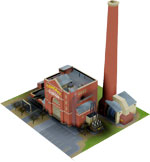
Pros: Coal can provide a good quantity of power, enough for a sizable city, and is fairly cheap if you have coal under your city to mine.
Cons: Coal is dirty! The power station itself, especially when equipped with the basic generators, throws out an alarming quantity of ground and especially air pollution. If you happen to dig up your own coal in addition then you'll soon find that a mining industry in your city will blight your landscape for decades and cause widespread and persistant sickness.
In SimCity, just like in the real world, they like to pretend there is such a thing as 'clean coal', which means you can upgrade your generators so they will produce slightly less pollution and use up less coal, but they will also cost more and will not produce any more power. The clean coal research project is one of the more expensive ones, however I strongly recommend that if you are going to bother, it's better to do it sooner rather than later to help reduce some of that awful pollution!
For more information:
| Coal Power: Station base cost: $25 /hr | |||||
| Generator | Cost | Per Hour | MW Output | Max Per Station | Prerequisites |
| Dirty Coal | $5000 | $425 + 0.18 tons of coal /hr | 75MW | 300MW | None |
| Advanced Coal | $15000 | $375 + 0.36 tons of coal /hr | 75MW | 300MW | None |
| Clean Coal | $20000 | $600 + 0.24 tons of coal /hr | 75MW | 300MW | University + School of Engineering in Region and complete clean coal research project ($175000) |
 Oil Power
Oil Power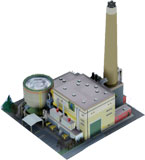
Pros: Oil produces less air pollution than coal and produces twice as much power for a little less than double the cost when comparing the basic generators. Oil can be imported without huge expenditure if you don't have any in your city so long as your power needs are modest and the market is in your favor. If you do have oil fields then an oil well will cost you more than a coal mine, but it produces less pollution. Upgrading your generators will reduce your oil consumption, and the clean oil generator is less than double the cost of the basic one for a great deal less pollution.
Cons: Oil does still create as much ground pollution as coal and, just as with the coal station, investing in the advanced upgrades doesn't give you any more power. Oil is more expensive than coal, if you have high power demands the costs can rise considerably, especially with unkind fluctuations in the global market. What starts out as an initially affordable power option could end up being a staggering expense.
For more information:
| Oil Power: Station base cost: $100 /hr | |||||
| Generator | Cost | Per Hour | MW Output | Max Per Station | Prerequisites |
| Conventional | $7500 | $756 + 1500 barrels of oil /hr | 150MW | 600MW | None |
| Combustion | $20000 | $1185 + 500 barrels of oil /hr | 150MW | 600MW | None |
| Clean Oil | $27000 | $1295 + 1000 barrels of oil /hr | 150MW | 600MW | University + School of Engineering in Region and complete clean oil research project ($72000) |
 Solar Power
Solar Power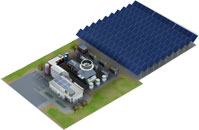
Pros: The major benefits of solar power is that it is another pollution-free option (I mean really... who dreams up this stuff?), and it is very cheap to run, the per hour cost is the lowest per MW of any of the power generation options. A fully expanded solar array using concentrated solar array dishes also produces just as much power as an expanded oil power station, making it viable even for busy cities.
Cons: One downside of solar power is that because it creates energy from sunlight, it can only power your city at night from energy stored in it's batteries. In practice that means there is less power available during the night, so it's important your power generation capacity is much greater than your city's power need in order to avoid night time brown-outs. The peak MW quantity can be less than a third of maximum output during night hours.
Unlike wind, where some cities have lots and some have very little, all cities get an equal amount of sunlight... but this seemingly infinite resource can actually be harmed by atmospheric pollution! If you have lots of regional air pollution this will reduce the effectiveness of solar panels. This can become quite significant in the large regions if you have lots of cities generating heavy air pollution.
Although the running costs are low, the initial investment costs are very high and the basic fixed solar array is bulky, approximately 96x96 meters which is the same size as a high density residential building. The concentrated solar array is a worthwhile upgrade, they are smaller and produce a lot more power, albeit at a much higher cost, but they take up less space and look (I think) rather elegant!
| Solar Power: Station base cost: $40 /hr | |||||
| Generator | Cost | Per Hour | MW Output | Max Per Station | Prerequisites |
| Fixed Solar Array | $16000 | $105 /hr | 12.1MW | 64MW | None |
| Concentrated Solar Array | $40000 | $320 /hr | 37.5MW | 600MW | University + School of Science in Region and complete Concentrated Solar Array research project ($62500) |
 Nuclear Power
Nuclear Power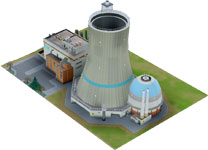
Pros: The obvious upside of nuclear power is that it is capable of generating an enormous quantity of power, enough to run a very busy city and a couple of smaller neighboring cities too if you have the upgraded reactors. It also produces no pollution (obviously Sims have thought of a smarter way to deal with their radioactive waste).
Nuclear power is also the cheapest per MW, which lets face it, is rather important when you've got a busy and expensive city to run! Additionally, since in SimCity the raw materials for nuclear power just magically appear, they are equally usable in all cities, so long as you can produce the water they need.
Cons: Arguably the biggest downside is nuclear meltdowns, which result in radioactive fall-out which spreads a considerable distance across your city (around 1km in every direction, which typically means at least a quarter of your city will be uninhabitable).
The first cause of meltdowns are lack of educated workers. It doesn't matter what types of schools you use, but it's vital that you have enough AND that your Sims can get to them because if general enrollment falls, or the population increases beyond your classroom availability when you're not paying attention and then... well.... BOOM!
 If you use nuclear power, keep an eye on your worker education level. Anything less than 'safe' and you should shut down your power plant immediately!
If you use nuclear power, keep an eye on your worker education level. Anything less than 'safe' and you should shut down your power plant immediately!In addition to uneducated workers, your nuclear plant can also fall prey to disasters. Typically most disasters will strike in more central areas of your city, so you can reduce the danger a bit by locating your power station towards the edge of your city. I would also like to pass on my own cautionary tale - do NOT put your nuclear power plant close to a garbage tip. One of my power plants got smooshed by a big lizard and now my city looks (funny coincidence...) like a post-nuclear wasteland.
Nuclear plants are rather bulky, the neutron reactors in particular are enormous, so it's a good idea to leave plenty of room to place this huge building later on in your city's development.
Another major issue which shouldn't be overlooked, is at all levels, the nuclear power station consumes massive quantities of water. If your city is on the verge of running dry, this is not the power solution for you!
For more information:
| Nuclear Power: Station base cost: $100 /hr | |||||
| Generator | Cost | Per Hour | MW Output | Max Per Station | Prerequisites |
| Gen I Thermal Reactor | $45000 | $1200 /hr | 200MW | 800MW | None |
| Gen II Thermal Reactor | $75000 | $2300 /hr | 400MW | 1600MW | University + School of Science in Region and complete Gen II Reactor research project ($300000) |
| Fast Neutron Reactor | $130000 | $3200/hr | 600MW | 2400MW | University + School of Science in Region and complete Fast Neutron Reactor research project ($400000) |
 Conclusions & Comparisons
Conclusions & ComparisonsSo which is best? To an extent which you choose will depend on what type of city you want to create, and what natural resources your city has.
 Wind power is always a great option for a new city starting out, it's cheap to place and expand and works very well in hilly cities, the higher the altitude, the faster the wind!
Wind power is always a great option for a new city starting out, it's cheap to place and expand and works very well in hilly cities, the higher the altitude, the faster the wind!Nuclear power is not really the ideal option for your hicksville town full of idiot yokels. If you want a high tech green city then you really don't want lots of dirty coal. There's probably not much point in spending a lot of money on an oil power station to power your coal mining town, why not use the stuff you are already digging out of the ground?
 Nuclear has the cheapest cost per hour and the greatest power output but carries with it potential for great danger
Nuclear has the cheapest cost per hour and the greatest power output but carries with it potential for great dangerMore often than not it probably boils down to cost, so below is a comparative summary of the running costs. The purchase cost refers to the total cost of a single station plus the maximum allowed number of generators of the specified type - in short, what it costs to buy the 'complete' station.
I have not taken into account the cost per hour of mining coal and drilling for oil, nor the associated costs of storage and distribution as these will vary from city to city or indeed the water requirements. Additionally I have based the total costs of these raw materials on the fixed prices noted as the global market feature of the game is currently disabled (at time of writing). With price fluctuations in these commodities there will be the possibility to pay considerably less, or perhaps considerably more for your city's fuel.
Finally the table also includes the pollution output (ground and air), the values given are based on a single generator of the specified type working at full capacity (some take a while to become fully operational).
| Comparison of running costs, power and pollution output of power stations & generators | ||||||
| Generator | Purchase Cost | Max MW | Cost /hr | MW Cost /hr | Ground Pollution | Air Pollution |
| Wind: Small Turbine | $123000 | 72 MW (10mph wind) | $985/hr | $13.68 per MW/hr | None | None |
| Wind: Large Turbine | $248000 | 122.4 MW (10mph wind) | $1465/hr | $11.96 per MW/hr | None | None |
| Wind: Vertical Turbine | $488000 | 360 MW (10mph wind) | $4105/hr | $11.40 per MW/hr | None | None |
| Coal: Dirty Coal | $37000 | 300 MW | 6,656 PPM | 1,130,304 PPM | ||
| Coal: Advanced Coal | $77000 | 300 MW | 4,992 PPM | 876,960 PPM | ||
| Coal: Clean Coal | $97000 | 300 MW | 3,328 PPM | 604,128 PPM | ||
| Oil: Conventional | $167500 | 600 MW | 6,656 PPM | 876,960 PPM | ||
| Oil: Combustion | $107500 | 600 MW | 4,992 PPM | 682,080 PPM | ||
| Oil: Clean Oil | $135500 | 600 MW | 3,328 PPM | 389,760 PPM | ||
| Solar: Fixed Array | $265000 | 64 MW | None | None | ||
| Solar: Concentrated Array | $665000 | 600 MW | None | None | ||
| Nuclear: Gen I Thermal Reactor | $280000 | 800 MW | None | None | ||
| Nuclear: Gen II Thermal Reactor | $445000 | 1600 MW | None | None | ||
| Nuclear: Fast Neutron Reactor | $665000 | 2400 MW | None | None | ||
 Nuclear Fallout: Radiation
Nuclear Fallout: RadiationAs noted above, insufficient educated workers and disasters can cause your nuclear power plant to fail and a meltdown to occur resulting in widespread radiation.
Radiation will cause residential zones to collapse into abandoned buildings; the worse the radiation levels the faster Sims will abandon buildings in the area. Sims that travel through it will get sick and unhappy, if you pump water within a radioactive area, it will pollute the water and cause your whole city to become ill.
Radiation will disappear on it's own eventually - by this I mean that the lightest band shown on the radiation map will return to normal within 34-35 game years, the next darkest band will take around 70 years, the next band around 140 years etc (each band has a factor of 2x). The more reactors that blow, the higher the radiation levels and therefore the larger the affected area and the deeper the color bands on the radiation data map.
It is worth noting that the DLC does add the option to place radiation scrubbers, however a) I don't have the DLC so I can't comment on this from my own experience but b) I have seen comments from other players saying they are expensive and pretty useless... so yeah...
 Radioactive land will take at least 34 game years to start to clear, the worst affected areas will take more than 500 years to return to normal
Radioactive land will take at least 34 game years to start to clear, the worst affected areas will take more than 500 years to return to normalIn that respect whilst abandoning your city is an option, if you're determined to stick with it, you need to do some major re-building to work around the problem whilst you wait.
Source:
NO!
Let me just repeat that to be clear... NO! Parks will help combat the aftermath of regular pollution but not radioactive land.
Although it is not a disaster in the strictest sense (i.e. one of the set disasters you can choose to deliberately unleash upon your Sims, or which will, from time to time, be sent to bug you whilst you're busy city building), I have opted to add a few notes on it to the disasters article:
For more information: